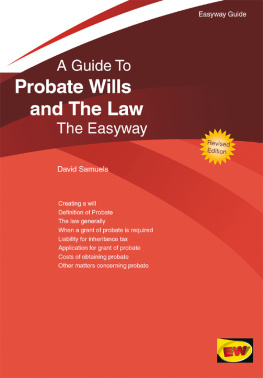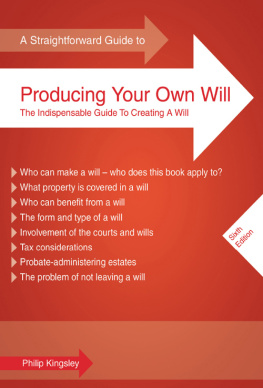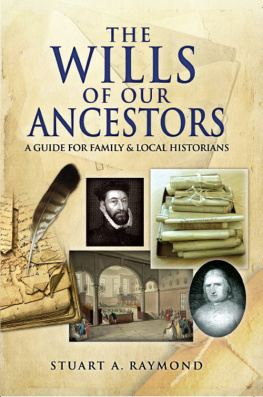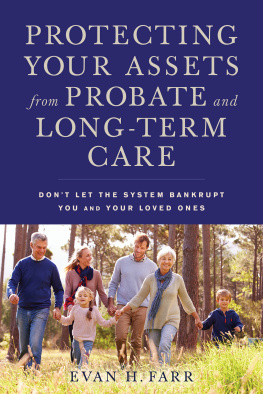Contents
Guide
A Guide to Probate, Wills and
the Law
David Samuels
Easyway Guides
Easyway Guides
Straightforward Publishing 2018
All rights reserved. No part of this publication may be reproduced in a retrieval system or transmitted by any means, electronic or mechanical, photocopying or otherwise, without the prior permission of the copyright holder.
British Cataloguing in Publication Data. A catalogue record is available for this book from the British library.
ISBN 978-1-84716-777-4
978-1-84716-851-1 (ePub)
978-1-84716-846-7 (Kindle)
Series Editor: Roger Sproston
Printed by 4edge www.4edge.co.uk
Cover design by Bookworks Islington
Whilst every effort has been taken to ensure that the information in this book is accurate at the time of going to press, the author and publisher recognise that the information can become out of date. This is particularly relevant to legal and tax information. The book is therefore sold on the understanding that no responsibility for errors and omissions is assumed and no responsibility is held for the information held within.
Contents
Introduction
A Guide to Probate, Wills and the Law, updated to 2018, outlines the main steps that need to be taken when acting as an executor or administrator of an estate and also applying for probate and distributing the estate.
Death and dealing with death, particularly of a loved one or one who is very close, is an upsetting experience and needs to be dealt with sensitively. The last thing that most people want to deal with is the estate of the deceased person.
However, it is this aspect of death that causes the most problems in many cases. In a persons life there are many elements such as savings and investments, properties, pensions and other assets that accumulate. In many cases, when a person dies, no will has been left and it is down to friends and families to deal with these assets and to deal with the tax situation that may arise. Of course, life is easier if a will has been left spelling out who are the executors of the estate but even here the aftermath can be complicated.
This book will guide the reader through the five distinct stages: the meaning of probate; the will; actions pre-probate; applying for probate; distributing the estate. Although the stages .
The book should prove useful to those who are in the process of dealing with the estate of a deceased person and hopefully make the whole situation clearer and less complicated.
In Scotland and Northern Ireland the procedures are slightly different to those in England and Wales, which this book mainly deals with. For more advice and guidance on probate and the law in Scotland you should go to:
www.scotcourts.gov.uk/taking-action/dealing-with-adeceaseds-estate-in-scotland
For Northern Ireland go to www.courtsni.gov.uk/en-GB/Services/Probate/Pages/ProbateInformation.aspx
**
Chapter 1
Probate Generally
What is probate?
When a person dies, it is necessary for someone to be appointed, with legal authority, to manage the deceaseds financial affairs and wind up his/her estate. In law, the uncompleted financial matters of a deceased are known as the estate and the person who is given the legal authority to wind up the estate is called the legal personal representative. After the application for probate, the document which proves the legal authority of the personal representative is called the grant of representation to an estate.
Where to get a grant of representation to an estate
Grants of representation to an estate are obtained from an office of the High Court known as the Probate Registry. The process of obtaining the grant is commonly known as probate.
If someone leaves a will but dies without appointing an executor to carry out the terms of that will, or if the executors who are appointed by the will are unable or unwilling to carry out the duties of an executor, then the grant of representation obtained from the probate registry to prove that the will is a valid one and to authorize the person who obtains it to carry out its terms is called letters of administration with the will annexed. If someone dies without making a will, that person dies intestate and the grant of representation obtained from the probate registry to authorize someone to wind up the estate is called letters of administration of the estate. Those who obtain letters of administration are known as administrators of the estate. The main difference between the executor appointed under the will and the administrator of an estate are that an executors powers are given by the will and are more or less immediate whereas the administrators powers cannot be exercised until the Registry has appointed the administrator.
Essentially, probate and letters of administration can be seen as title documents to the assets of the deceased persons estate. However, there are a few assets where they are not required and can be dispensed with. These include what are known as nominated assets, jointly owned assets owned as joint tenants, estates of small value and estates which consist entirely of personal effects and/or personal currency. There may however still be a requirement to deal with HMRC in relation to inheritance tax. If in doubt contact the HMRC helpline 0300 123 1072 and outside UK 44+ 300 123 1072..
Property held jointly
Assets owned jointly are those that are not held in the sole name of the deceased. In English law, there are two ways of owning property jointly, either as joint tenants or tenants in common. In this sense, the word tenant doesnt mean tenant in the sense of landlord and tenant but is used universally in relationship to ownership of property.
If property is held as joint tenants the law clearly states that on the death of one of the owners, that persons share of the property does not become part of his estate (except for the purposes of Inheritance tax), it is inherited by the surviving joint owners, regardless of what is contained within the will. However, if property is held as tenants in common, the law states that on the death of one owner that persons share of the jointly owned property does become part of his or her estate.
The line between jointly owned property and property held as tenants in common is fine. However, there are a few obvious indicators. Usually, if bank or building society accounts are held jointly, along with stock and shares, they are considered joint tenancies. However, there has to be evidence of equal ownership of property. Any evidence to the contrary such as unequal payments, or sharing of rents, dividends etc, can mean tenancy in common.
Value of the estate-Estates valued under 15,000 gross
If the value of an estate before deducting the cost of the funeral and any debts left by the deceased is under 15,000, it is usually worth contacting organizations such as banks or building societies holding assets, to request that they make payment to the personal representative without going through the formalities of obtaining a grant of representation. They may or may not co-operate but it is worth contacting them. If the amounts involved are low then banks or building societies will co-operate on sight of a valid original will or if there is no will they will deal with the next of kin and a solicitor.
Obtaining a grant of representation and letters of administration









